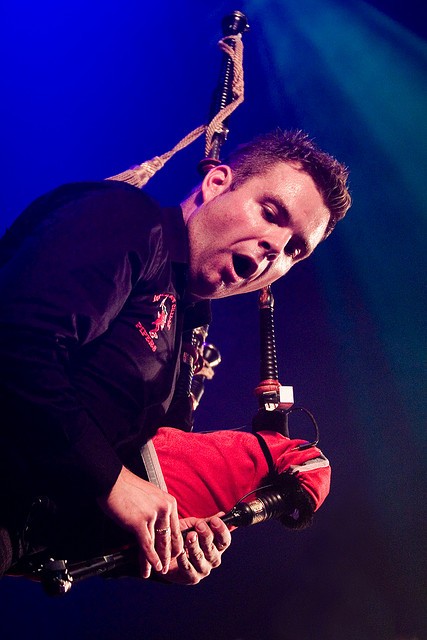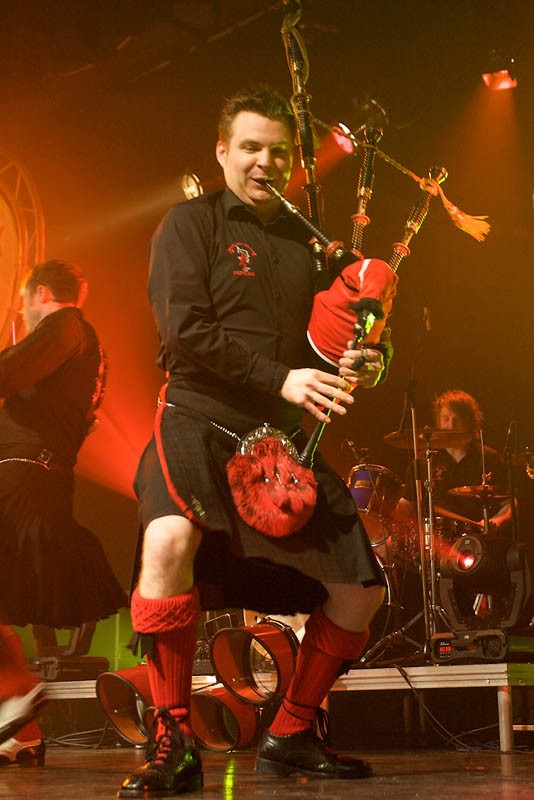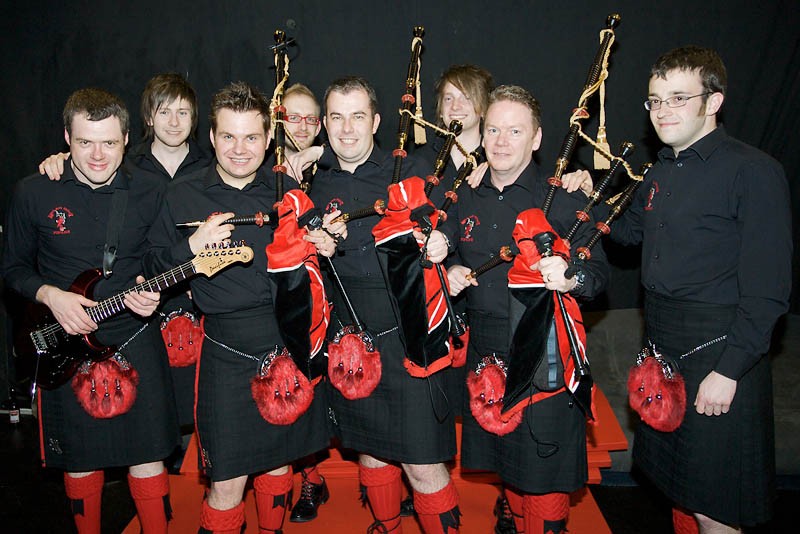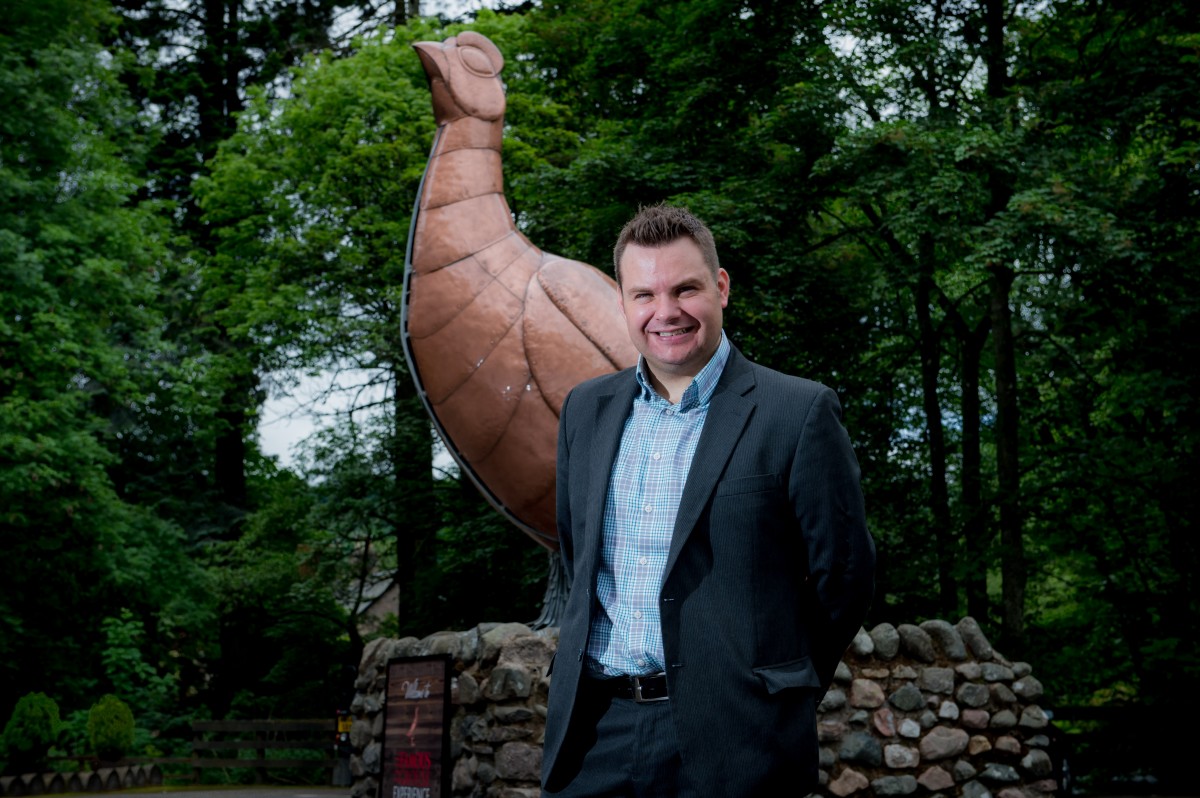×
Recently I have found myself seeing / hearing an unusual level of chat about two big shot Scottish institutions. My friend Lynne would say it’s the universe sending me a message. However, as said chat has been about The Famous Grouse and The Red Hot Chilli Pipers it seemed unlikely it would come to anything more than further applause for these great icons of our small country.
As well as being a constant presence in Perthshire, The Famous Grouse made the Saintees win back in May all the sweeter when he donned a blue and white hat and scarf combo at Broxden Roundabout. Glenturret’s brilliance at both distilling whisky and welcoming tourists is readily accepted in Perthshire. And it seems that since the Chilli Pipers covered Avicci’s legendary dance tune in January for Radio 1’s Big Weekend they’ve never been out of our social media stream or newspapers.
Then I interviewed Douglas Gillespie and during our chat he told me all about a brilliant man called Stuart Cassells; this was the man responsible for creating the global Bagrock phenomenon that is the Chilli Pipers and, it just so happens, the man who has recently taken control of the reins at The Famous Grouse Experience in Crieff.
Universe, I’m listening.
I meet up with Stuart on a cold but bright day at Edrington’s office at Walnut Grove. We sit in the lounge overlooking the Perthshire hills, whisky boards behind us, sheep dotted like balls of fluff across the landscape and golden leaves shining in the afternoon sun. It seems a fitting scene for a man so iconically Scottish.
What, I want to know, inspires someone to create a new musical genre? How do you then convince the world to get on board? And what happens when you have to walk away and leave it all behind you?
 Stuart Cassells was born in Falkirk to a man who loved the skirl of the pipes. His Dad had gone to Queen Victoria School and at the time you were chosen to be a piper, a drummer or a dancer. He was chosen for dancing but he was always desperate to be a piper and so, when Stuart came along he was encouraged to follow this much-sought-after path. It seems the passion was passed down through genes and as the other boys in his class aspired to be football players and movie stars, Stuart had his eye firmly on becoming a piper of worth. These magnificent men in the Pipe Bands were to him, the cool guys of Scottish music.
Stuart Cassells was born in Falkirk to a man who loved the skirl of the pipes. His Dad had gone to Queen Victoria School and at the time you were chosen to be a piper, a drummer or a dancer. He was chosen for dancing but he was always desperate to be a piper and so, when Stuart came along he was encouraged to follow this much-sought-after path. It seems the passion was passed down through genes and as the other boys in his class aspired to be football players and movie stars, Stuart had his eye firmly on becoming a piper of worth. These magnificent men in the Pipe Bands were to him, the cool guys of Scottish music.
At the time, Gordon Duncan from Pitlochry, a man Stuart describes as the most innovative piper of all time, was leading the way in the Vale of Atholl Pipe Band. Stuart was a huge fan; The Vale of Atholl were undoubtedly the most innovative pipe band of the time and their legion of fans from across the world were unified in their belief that it was Gordon’s influence and style that had created this almighty powerhouse. Stuart joined the band at the age of fourteen, playing alongside these great musicians and travelling twice a week from Falkirk to Perth to practice.
“It was tremendous. I was travelling for the practice and then at weekends it was all competitions and events. When I wasn’t piping with the band I was in private lessons with Pipe Major George Lumsden and by the time I was 17 I was considered to be at the top end of piping in Scotland. I would spend my weekends playing for American Tourists who just loved this young Scottish boy with his pipes. I never got much homework done but by then knew I could make a living doing what I loved and that set me on my path. I was the resident piper at Cameron House for ten years and I covered Gleneagles when their guy was on holiday. Between the corporate and tourism gigs I was full time straight out of school.”
Keen to expand his formal training and knowledge, Stuart was accepted at the Royal Scottish Academy of Music and Drama (now Royal Conservatoire of Scotland) as part of the first influx of students on the bagpipes degree course. After four years, at twenty five years old, due to the alphabetised roll call, he was the first person ever to step on stage at a graduation ceremony and be awarded an honours degree in Bagpipes. Previously to that, traditional musicians such as Martyn Bennett, Chris Stout and Fraser Fifield had to come up through the classical music route. These were artists that Stuart looked up to and he cites Martyn Bennett as one of the best musicians ever to attend the RSAMD. His unique blend of traditional and harcore dance music was daring and exciting and it influenced the young Stuart greatly, showing him that it was possible to think outside the realms of ‘normal’ musical genre.
“I would stand by the fact that Martyn Bennet’s second release, Bothy Culture, is one of the greatest albums ever in Scottish Traditional Music. It has stood the test of time, making people realise that you can be a very talented musician without following the herd. He was so ahead of his time and showed beautifully that new and traditional could be brought together and transformed into something unique.”
“Towards the end of my first year at RSAMD, I was performing all the time. I was studying during the day and doing corporate gigs at nights and weekends. Sometimes I’d be on the same bill as band called The Gutty Slippers which, if I’m honest, weren’t the greatest musicians.
But I enjoyed it because it took the formality out of it all. They’d jump about the room and playing ‘Wild Thing’ and the audiences loved it. That’s when I had my idea for BagRock – What if there was a group of bagpipers, who were top players, combining the new innovative style of bending notes and vibrato like Gordon Duncan with the informality of the Gutty Slippers”
Stuart was convinced that if he could polish what the Gutty Slippers were doing on well tuned bagpipes they could create a new sound and show the world what the pipes were truly capable of. His idea swirled round his head for some time until one night, with his then girlfriend helping, he set about putting his CDs into order.
“Whilst helping me tidy my flat in Glasgow, she put my Red Hot Chilli Peppers CD in beside the bagpipes CD’s because she’d read it wrong. I thought it was brilliant. It was 3am in the morning and I phoned Willie telling him I had the perfect name. The whole idea just slotted into place. The next day I started calling some of the agencies I worked with and asked them to sell in the idea to their clients.”
The Red Hot Chilli Pipers had been born; they were gigging around Scotland, playing pipes like they were the electric guitar and before long they were getting gigs at top class venues and corporate events. It was piping and drumming but it was also modern, edgy and a lot of fun. They were young, fresh and presented a version of Scotland that showed a healthy respect for tradition but somehow sliced through the hackneyed “shortbread tin” image of pipes with a vibrant and modern vibe.
“We started off by working for free. We had to; no-one knew what they were getting! It didn’t take long for us to build up a following though and we started to get asked back for paid gigs.
 I remember clearly the turning point for us. We’d been on a few gigs by this point and we were booked to do a wedding reception in the Grassmarket. We played everyone into the meal and you were lucky if we raised a smile never mind a clap. We headed across the road to a wee pub where a Wales V Scotland rugby game was showing and after a couple of beers we had the pipes out and the whole place was buzzing. By the time we got back to the wedding reception for round two we were hyper. We jumped on the top table and started playing. I looked down at the bride who was gazing up at us and clapping along and that was it – everyone went wild. From then on we played without fear and no matter how formal the gig was, that’s what we did.”
I remember clearly the turning point for us. We’d been on a few gigs by this point and we were booked to do a wedding reception in the Grassmarket. We played everyone into the meal and you were lucky if we raised a smile never mind a clap. We headed across the road to a wee pub where a Wales V Scotland rugby game was showing and after a couple of beers we had the pipes out and the whole place was buzzing. By the time we got back to the wedding reception for round two we were hyper. We jumped on the top table and started playing. I looked down at the bride who was gazing up at us and clapping along and that was it – everyone went wild. From then on we played without fear and no matter how formal the gig was, that’s what we did.”
Now, as well as running about with The Red Hot Chilli Pipers entertaining the masses with his new-found Bag Rock, Stuart also ran a Bagpiping Agency that supplied musicians to events and for random requests (remember the Hewlett Packard ad? With 110 pipers? That was him.) It was through this agency that he was asked to supply twelve pipers to T In The Park 2004 for an encore at the finale. David Bowie had pulled out, The Darkness were bumped up the bill to the headline spot and they had this idea that they’d like to do their encore with pipers.
“I got the original five Chillis together and added in a few friends to make the twelve. The Chillis had another gig booked in Edinburgh earlier in the night and we literally came out of that and drove like madmen all the way down to Balado. The other eight or nine guys were already there and when we arrived we drove right up to the back stage and ran on. We did “Love Is On The Rocks” with The Darkness and it was incredible. I turned to Willie at one point and said ‘one day this’ll be us’. He told me I was having a laugh!
I was interviewed when we came off by the Sun and Daily Record newspapers and when they asked me what the group was called I said it was The Red Hot Chilli Pipers. The next day in the Sun Newspaper, the review of the Darkness was all about The Red Hot Chilli Pipers."
The nation had fallen in love and we claimed them as our own.
It was a couple of years later before the height of their success really began to take shape. Stuart spotted an advert in a newspaper for a new TV show called ‘When Will I Be Famous’. They were looking for variety acts but by the time Stuart knew about it the auditions were underway. The message when he called was ‘if you’re going to come, you need to come now.’ He called a guitarist and a drummer, told them to get out their beds and did the auditions with no time to practice or spare. They got a call back that night.

“It wasn’t the proper Chilli Piper line up we auditioned with so we had to beg them to let us come back as the full act. Thankfully they said yes and by the time we played the last show live on BBC one on a Saturday night there was an audience of 8 million people. We won it – it was amazing.
We were in London, it was an English crowd and we still won it. I knew these things were possible because in 2005 I had won the BBC Young Traditional Musician of the Year. In fact, I’m still the only bagpiper ever to have won that. But the fact that we had reached the final outside of Scotland was staggering. I knew that there was a much broader appetite for the pipes if they were played for the masses and our win that night proved it.”
Now, pay attention because this is where it starts to accelerate. Stuart’s other band, ‘The Stuart Cassells Band’, had a big traditional following and was booked at Celtic Festivals right across Europe. That may sound great, but after their win demand for the Chillies went stratospheric but there was no way he could fulfil all of it. So, in true let’s-just-do-it style he started phoning round the gigs and before long he had merged the two together.
“The biggest problem was that the Chillies only had a twenty minute set so we had to teach them all the Stuart Cassells Band concert stuff and hope it worked!”
That summer they played the Festival Interceltique de Lorient, the world’s largest Celtic Festival. Someone videoed them, stuck it up on YouTube (we were pre twitter and facebook remember people!) and within days they had climbed to half a million hits.
“I think it was because it was natural, just a punter with a hand-held camera at the back of the audience. It captured the spirit of the gig. We were now firmly on the map and when we released the first Album, Bag Rock to the Masses, that December we sold 150,000 copies. It was the highest selling album in Scotland that Christmas and has sold about 300,000 copies worldwide now. In 2008 we followed it up with the DVD recorded live from The Fruitmarket and that was us. World tours, guest appearances, huge gigs. It was amazing.”
Stuart gets a bit thoughtful at this point in our conversation; how to describe what happened next? During a tour he began to experience problems while he was playing. There was a tensing in his fingers and they would go into spasms when he played. He took a break for six months but it didn’t help – he tried massages, botox, drugs for parkinsons but the problem was getting worse and he knew he could do nothing to stop it.
He was diagnosed with Focal Dystonia, a disease that causes the misfiring of neurons in the brain, known commonly as musician’s cramp. The disease is neurological and affects a muscle or group of muscles causing involuntary muscular contractions and abnormal postures. His years of playing and practicing were now all part of this problem but for Stuart, it couldn’t be the end.
“I was riding the crest of a wave. We were doing well, we were in demand. There was no way I was giving that up - what else could I do for a start? I tried for two years to manage it but I wasn’t playing well. I was fighting it with everything I had. It was accepted and recognised that I was the best piper in the band. Or at least I had been. But on a good day I played as well as the others and on a bad day it could be a car crash to watch and listen to. I was so determined I was going to keep doing the solos as well; in the end it was torture for all of us.”
In 2011 The Red Hot Chilli Pipers were playing in Milwaukie in front of 30,000 people. Skerryvore were there with them, they played the Saturday night and as it came to a close Stuart made a decision that the next night would be his last gig. On the Sunday he called everyone together and told them of his decision. It was four weeks before their first ever tour of Australia and New Zealand and he was leaving.
“We had a right hoolie that night. We invited Skerryvore onto the stage with us and it was just a big party. My whole year was laid out before me and suddenly it was no more.”
He deadpans his next line. “I was free to do what I wanted.”
Except of course, that what he wanted he could no longer have. I don’t mind telling you all, I was close to tears at this point in the conversation. The drive and passion that led one man to pull off the creation of a new musical genre, to take it to the masses, crashing onto a global stage comes from a place that runs deeper than talent alone. You have to want it. Really, really want it, with everything you have. How do you just turn that off?
“I went to New York for five months and had a rest, chilled out, cleared my head. I met a Northern Irish girl called Michelle who was over for a weekend workshop, I flew home for Xmas to meet her and then I flew back to New York for New Year and flew her over too and for the next year we carried on with this long-distance relationship. I was living off of my savings but it started to get boring. You have to remember that as well as the playing, there was a business behind the band. I had built this million pound business and although I had lots of help and needed all the accountants and lawyers around me, I was the driving force behind it. So, as they say, time heals and there I was looking for something to do again.”
In 2012 Stuart applied to the Saltire Foundation which looks to train Scotland’s business leaders of the future. It was an MBA style programme at Babson College in Boston, an institution that is recognised as the world’s number one business school for entreprenuership. He was accepted and, as you’d expect, went for it big time. Michelle went back to New York, he was studying six days a week and focusing on this chance to prove his worth outside of the Chilli Pipers.
“I had four months in Boston and then a four month placement at Edrington who support the programme. I knew I had to make a big impression. Whisky felt right to me; it felt like I could do it well and that I wanted to stay. After my placement they created a job for me - Brand Development Executive - and suddenly I went from being a free spirited, big, loud musician to a nine-to-five office man. I know that sounds negative but I don’t mean it to - it was just so hugely different that it was a shock at first.”
Stuart started Edrington’s Whisky Gems project which is a small business within the big business. The idea was to bring profit to excess whisky stock and give them an option to do more than just blend it. It was highly successfully and the project continues.. But for Stuart the real opportunity presented itself in the form of General Manager at The Famous Grouse Experience. He knew this was the job for him.
“They had a lot of hidden gems at Glenturret and so the idea was that I could merge the two jobs. It’s a big job at a big tourist attraction but for me it was a great fit. I started in May and although it’s been a challenge I’ve loved every minute of it. On the stage I had the biggest ego of them all and for me this is about entertainment. A visitor attraction is all about making people smile, making them clap, giving them a memory to take away and enjoy again and again – a real experience. The distillery is full of characters that can tell stories and with this knowledge and experience you can train magicians and actors to turn a day out into something really special. And of course, there’s the small matter of incredibly good whisky!”
In July this year his old pal Willie from the Red Hot Chilli Pipers called him up and told him they were going to be playing the main stage at T In The Park. He reminded him of his “One day this’ll be us” statement. They had made it. I asked Stuart if he went to see them and he shook his head. “Because you were busy or because it would’ve been too hard.” Long pause. “Maybe a bit of both.”
“There are young guys playing with the band now that I don’t even know. They’ve been in for a year and they’re popstars. I don’t know if they realise what we did to make it happen but I’m sure Willie keeps them right.”
The friendship that forged between Stuart and Willie is one of the great things that didn’t fall as a sacrifice to his disease. In October Stuart married Michelle, his Irish girl from New York (hooray!) and Willie stood beside him as his best man. The bond they have is clearly strong and he jokes that although Willie and Kevin bought him out the business he still gets his royalties and so remains happy for them.
 “I was at a dinner last night until 3am; I drink more now than I ever did as a gigging musician! I feel fortunate to have a second career, and it feels good to have another of Scotland’s great icons in my hands. We’re busy planning for The Famous Festive Feastival and I know I’m in at the ground floor of something amazing again. This Feastival is going to grow and grow and all of these people who come and enjoy it, I want them to come back again and again to spend time with us.”
“I was at a dinner last night until 3am; I drink more now than I ever did as a gigging musician! I feel fortunate to have a second career, and it feels good to have another of Scotland’s great icons in my hands. We’re busy planning for The Famous Festive Feastival and I know I’m in at the ground floor of something amazing again. This Feastival is going to grow and grow and all of these people who come and enjoy it, I want them to come back again and again to spend time with us.”
Like fans then?
Nodding. Smiling.
“Yeah. Exactly the same. Only entirely different. I was asked around thirteen if I wanted to be the best bagpiper in the world. I replied I wanted to be the most Famous. I strived for that with the Red Hot Chilli Pipers.
Now as GM of The Famous Grouse Experience, I can finally say I’m the most Famous bagpiper in the world!"
***
The Famous Feastival runs on Saturday 6th December at The Famous Grouse Experience in Crieff. To find out more this fantatsic event click over to our events section here.

Ben Wilde has an impressive resume. At the age of 25 he is director of his own audio business with a solid reputation in the music industry, and a cli
Scott Burton's path from troubled teenager to minister of St Matthews on Tay Street is as surprising as his pink mohawk! Here's how it all happened!
August 10th Friday
Graeme Pallister, Chef Patron of 63 Tay Street in Perth talks about his life's great passions and the road that has brought him to rest at happy.
August 3rd Friday
Read all about Peggy Brunache, the woman behind the soul food at Southern Fried Festival in Perth.
July 20th Friday
SCBP
Perthshire's only online magazine